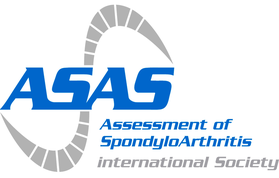Profile of:
Désirée van der Heijde
Désirée van der Heijde obtained her medical degree in 1986 from the Catholic University in Nijmegen, the Netherlands. She completed her PhD in 1991 and became a Board-Certified Rheumatologist in 1993. Following a 1-year appointment in Sweden in 1993, she joined the Department of Rheumatology at the University Hospital Maastricht until 2007, when she took up her current position as Professor of Rheumatology at the Leiden University Medical Center. Since 2007, she has also been affiliated to the Diakonhjemmet Hospital in Oslo, Norway. Her major research interest is in the methodology of outcomes assessment and its application in clinical research. Specific areas of interest are radiographic scoring methods in rheumatoid arthritis, psoriatic arthritis, and spondyloarthritis, as well as scoring of magnetic resonance imaging in spondyloarthritis. She was the Chairperson of ASAS from 1995 to 2012 and the Chair of the EULAR Standing Committee for Clinical Affairs and the ACR-EULAR liaison officer between 2011 and 2019. From 2019 onwards, she is the chair of the Executive Committee of FOREUM. She received the prestigious Carol Nachman Award for her scientific contributions to rheumatology in 2011, a doctorate honoris causa from the University of Ghent in Belgium in 2012, and the Jan van Breemen medal in 2017. She is an honorary member of EULAR. She has published more than 950 papers in the international literature, as well as multiple chapters in leading rheumatology textbooks. She is associate editor of the Annals of Rheumatic Diseases.
Full name: Désirée van der Heijde
Current country: Netherlands
Membership level: Full
Type of membership: EC
Number of publications: 14
ASAS-EULAR recommendations for the management of axial spondyloarthritis: 2022 update (2023)
https://pubmed.ncbi.nlm.nih.gov/36270658/
Efficacy and safety of biological DMARDs: a systematic literature review informing the 2022 update of the ASAS-EULAR recommendations for the management of axial spondyloarthritis (2023)
https://pubmed.ncbi.nlm.nih.gov/36270657/
MRI lesions of the spine in patients with axial spondyloarthritis: an update of lesion definitions and validation by the ASAS MRI working group (2022)
https://pubmed.ncbi.nlm.nih.gov/35609977/
Efficacy and safety of upadacitinib for active ankylosing spondylitis refractory to biological therapy: a double-blind, randomised, placebo-controlled phase 3 trial (2022)
https://pubmed.ncbi.nlm.nih.gov/35788492/
Upadacitinib for the treatment of active non-radiographic axial spondyloarthritis (SELECT-AXIS 2): a randomised, double-blind, placebo-controlled, phase 3 trial (2022)
https://pubmed.ncbi.nlm.nih.gov/35908570/
Instrument selection for the ASAS core outcome set for axial spondyloarthritis (2022)
https://pubmed.ncbi.nlm.nih.gov/35680390/
Imaging Outcomes for Axial Spondyloarthritis and Sensitivity to Change: A Five-Year Analysis of the DESIR Cohort (2022)
https://pubmed.ncbi.nlm.nih.gov/32976683/
Axial spondyloarthritis (2021)
https://pubmed.ncbi.nlm.nih.gov/34615639/
Integrated longitudinal analysis does not compromise precision and reduces bias in the study of imaging outcomes: A comparative 5-year analysis in the DESIR cohort. (2020)
https://pubmed.ncbi.nlm.nih.gov/32209237/
What is axial spondyloarthritis? A latent class and transition analysis in the SPACE and DESIR cohorts. (2020)
https://pubmed.ncbi.nlm.nih.gov/31980546/
Which imaging outcomes for axSpA are most sensitive to change? A 5-Year analysis of The DESIR Cohort (2020)
https://pubmed.ncbi.nlm.nih.gov/32976683/
Facet joint ankylosis in r-axSpA: detection and 2-year progression on whole spine low-dose CT and comparison with syndesmophyte progression. (2020)
https://pubmed.ncbi.nlm.nih.gov/32417911/
Spinal Radiographic Progression in Early Axial Spondyloarthritis: Five-Year Results From the DESIR Cohort (2019)
https://pubmed.ncbi.nlm.nih.gov/30354022/
Efficacy and safety of upadacitinib in patients with active ankylosing spondylitis (SELECT-AXIS 1): a multicentre, randomised, double-blind, placebo-controlled, phase 2/3 trial (2019)
https://pubmed.ncbi.nlm.nih.gov/31732180/
